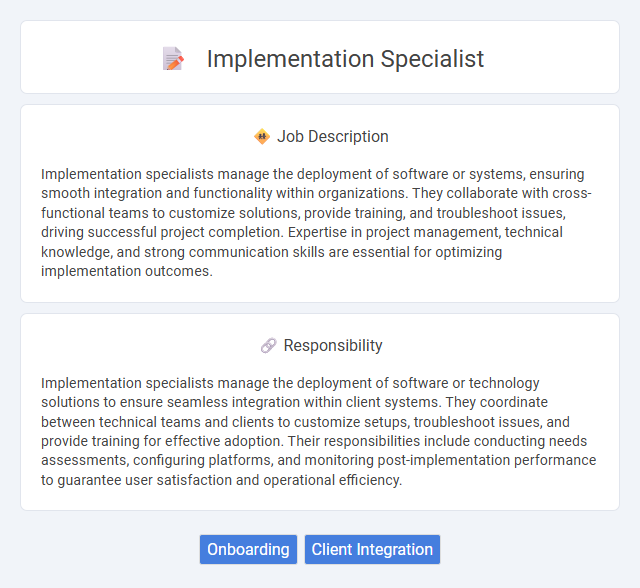
Implementation specialists manage the deployment of software or systems, ensuring smooth integration and functionality within organizations. They collaborate with cross-functional teams to customize solutions, provide training, and troubleshoot issues, driving successful project completion. Expertise in project management, technical knowledge, and strong communication skills are essential for optimizing implementation outcomes.
Individuals with strong problem-solving abilities and excellent communication skills are likely to thrive as implementation specialists. Those who are adaptable, detail-oriented, and comfortable working in dynamic, fast-paced environments may find this role particularly suitable. Conversely, people who struggle with multitasking or handling technical tasks might face challenges in meeting job expectations.
Qualification
An Implementation Specialist requires a strong technical background, often including a bachelor's degree in computer science, information technology, or related fields. Proficiency in project management methodologies and hands-on experience with software deployment, integration, and troubleshooting are critical qualifications. Effective communication skills and the ability to collaborate with cross-functional teams enhance the successful delivery of implementation projects.
Responsibility
Implementation specialists manage the deployment of software or technology solutions to ensure seamless integration within client systems. They coordinate between technical teams and clients to customize setups, troubleshoot issues, and provide training for effective adoption. Their responsibilities include conducting needs assessments, configuring platforms, and monitoring post-implementation performance to guarantee user satisfaction and operational efficiency.
Benefit
An Implementation Specialist likely enhances project efficiency by ensuring smooth deployment of new systems or software, reducing downtime and operational disruptions. They probably improve client satisfaction through thorough training and support, which can accelerate user adoption and maximize return on investment. Their expertise may help organizations avoid costly errors during integration, leading to more timely and successful implementations.
Challenge
An Implementation Specialist likely faces the challenge of navigating complex client requirements while ensuring seamless software integration. The role probably demands strong problem-solving skills to address unforeseen technical issues during deployment. Balancing tight project timelines with high-quality outcomes is expected to be a frequent obstacle.
Career Advancement
An Implementation Specialist drives project success by ensuring seamless software deployment and user adoption, positioning themselves as key players in digital transformation initiatives. Mastery of industry-specific tools and strong cross-functional collaboration skills lead to higher responsibilities such as Project Manager or Solutions Architect roles. Continuous certification in emerging technologies and agile methodologies accelerates career progression within technology and consulting firms.
Key Terms
Onboarding
Implementation specialists streamline the onboarding process by configuring software solutions tailored to client needs, ensuring seamless integration and rapid adoption. They conduct comprehensive training sessions and provide continuous support to new users, minimizing downtime and enhancing operational efficiency. Their expertise in project management and cross-functional collaboration drives successful client onboarding, resulting in higher satisfaction and retention rates.
Client Integration
An Implementation Specialist in Client Integration manages the seamless onboarding process by configuring software solutions tailored to client specifications, ensuring system compatibility and functionality. They collaborate closely with clients to gather requirements, troubleshoot integration challenges, and facilitate data migration for optimal performance. Expertise in API management, workflow automation, and cross-platform synchronization is critical for delivering efficient, client-centric technology implementations.
 kuljobs.com
kuljobs.com